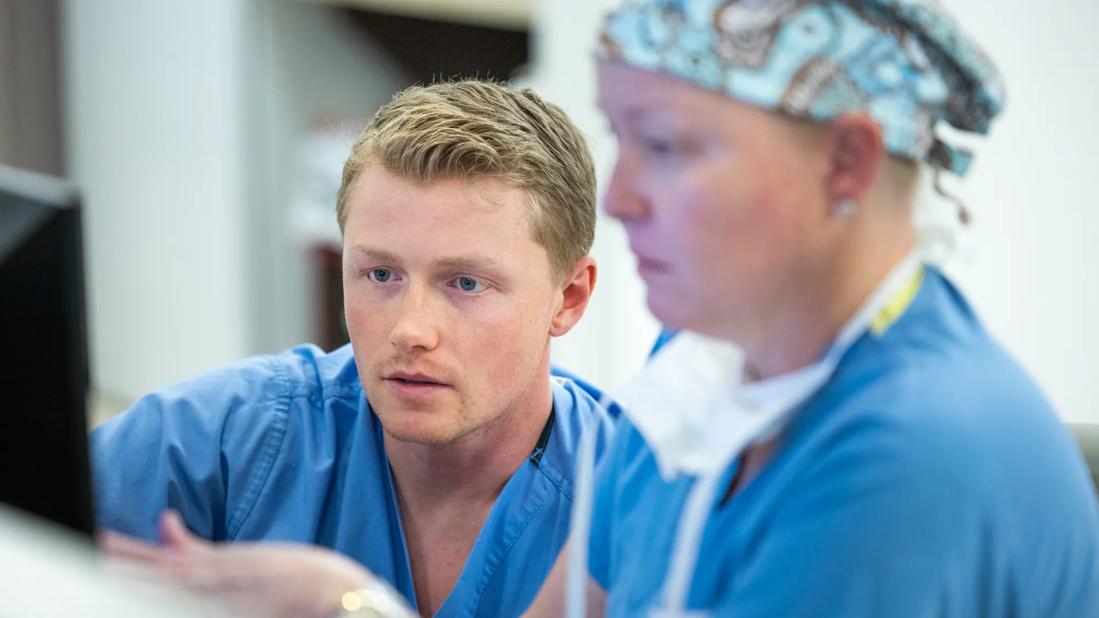Nurses describe how professional pairings can foster mutual growth

Nurse mentors are of vital importance to the students and novice professionals they guide. Although these seasoned nurses can be wellsprings of invaluable knowledge, students and young professionals can actually serve as teachers in their own right by offering fresh perspectives and insights to their more experienced colleagues.
Advertisement
Cleveland Clinic is a non-profit academic medical center. Advertising on our site helps support our mission. We do not endorse non-Cleveland Clinic products or services. Policy
“Mentorship is a two-way street. It’s a gift to transfer knowledge back and forth,” says Lydia Booher, PhD(c), APRN, ACNS-BC, ONC, a clinical nurse specialist at Cleveland Clinic Akron General Hospital. Throughout her 30-year career, Booher has interacted with countless nursing students and mentees, many of whom have affected her life in unexpected ways.
“We are never above our mentees,” Booher explains. “By creating a culture that emphasizes the individuality of every member of the team, you encourage the sharing of ideas and information. It’s a joy to help mentees dive into their careers and discover new strengths and interests.”
Booher says she’s also learned how to be a better mentor by watching how her role models have navigated their own careers. She explains that her longtime mentor, a college professor whom she met in 2009, recognized Booher’s potential and encouraged her to test her own boundaries. “She set an excellent example and propelled me forward in areas where I needed to grow,” says Booher. “By pushing me beyond my self-imposed limits, she helped me discover what I was capable of achieving. Whenever I have the opportunity to work with a new nurse, I think of all the lessons I learned from my own mentor.”
Even patients can provide important life lessons, adds Booher, who encourages caregivers to approach every interaction with an open mind and heart. She recalls a transformative experience she had while caring for a particular patient early in her career. The man, who was in his 20s and had lost both legs in an accident, explained that he’d had to relearn how to approach virtually every aspect of his life. At the time, Booher had been contemplating getting a driver’s license, but she was too afraid to actually get behind the wheel. The patient told her that if he could learn to live without a leg, she could certainly learn to drive – and she did.
Advertisement
“I was inspired by his courage,” she says. “I believe people are put in your life for a purpose. As a nurse, caregiver and human being, it’s so important to embrace these opportunities for growth.”
As a clinical advisor for the accelerated nursing program at Xavier University, which was developed in partnership with Cleveland Clinic, Janet Stratz, RN, BSN, SCRN is tasked with mentoring students and new nurses. Although she says she enjoys all aspects of the teaching experience, she is particularly proud to provide special support to students who are entering nursing as a second career. This dynamic is something to which she can relate, having embarked on nursing 10 years ago after leaving a two-decade career in sales and marketing.
“Working with every student is an honor and a privilege, but those who are entering nursing later in life often exude a refreshing sense of purpose,” says Stratz, a clinical instructor and assistant nurse manager at Cleveland Clinic Hillcrest Hospital.
Teaching has also reinvigorated her commitment to making a difference in the lives of those she mentors. “The past few years have been especially challenging for everyone in healthcare, but I think the COVID-19 pandemic took a unique toll on nurses. By investing in those who are new to the field, I felt I was doing my part to help remedy a situation that sometimes seemed overwhelming,” she says.
As an added bonus, Stratz explains that the mentor-mentee relationship can boost the less-experienced nurse’s confidence by reinforcing that they have what it takes to create a successful career. Likewise, the shared connection can remind the more-seasoned nurse how many skills they already have under their belt.
Advertisement
“When you’re in a fast-paced profession like nursing, it’s easy to get discouraged by all the things you weren’t able to accomplish in a particular day; it’s nearly impossible to check every ‘box’,” she says. “But when you take a step back and view your shift through a mentee’s eyes, you begin to recognize your own proficiency and appreciate how much expertise you have to offer.”
Perhaps most of all, Stratz enjoys sharing her enthusiasm for nursing with her students.
“As clinical instructors, we can help our students explore the human side of nursing that they don’t get in the classroom,” she explains. “I want them to see nursing as an art. In my mind, there’s nothing more satisfying or important than taking care of other people.”
Advertisement
Advertisement

Advanced software streamlines charting, supports deeper patient connections

How holding simulations in clinical settings can improve workflow and identify latent operational threats

Interactive Zen Quest experience helps promote relaxing behaviors

Cleveland Clinic and IBM leaders share insights, concerns, optimism about impacts

Cleveland Clinic partners with Palantir to create logistical command center

A Q&A with organizational development researcher Gina Thoebes

Cleveland Clinic transformation leader led development of benchmarking tool with NAHQ

Raed Dweik, MD, on change management and the importance of communication